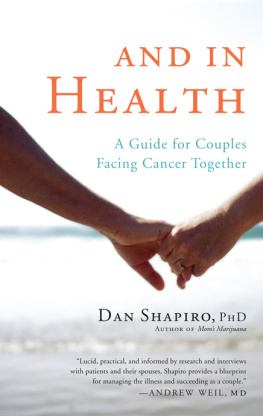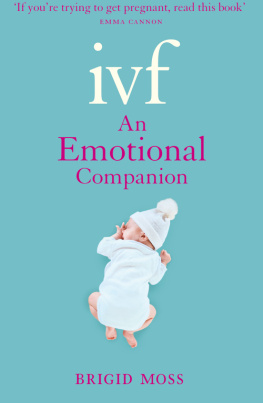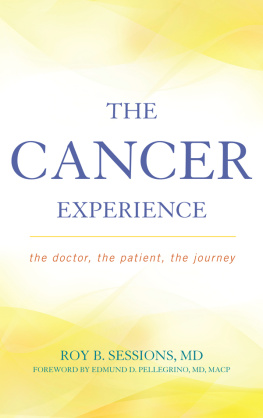Rockpool Publishing Pty Ltd
24 Constitution Road, Dulwich Hill NSW 2203, Australia
http://www.rockpoolpublishing.com.au
First published in 2007 by
Copyright Nichola Bedos, 2007
All rights reserved. No part of this publication may be
reproduced, stored in a retrieval system, or transmitted in
any form or by any means, electronic, mechanical, photo
copying, recording or otherwise, without the prior written
permission of the publisher.
National Library of Australia
Cataloguing-in-Publication Entry
Bedos, Nichola.
IVF & ever-after : the emotional needs of families.
1st ed.
Includes index.
ISBN 9781921295478 (epub).
1. Fertilization in vitro, Human. 2. Fertilization in
vitro, Human - Psychological aspects. 3. Infertility
Treatment - Psychological aspects. I. Title. II. Title :
In vitro fertilisation and ever-after.
618.1780599
Cover design by Holy Cow! Design & Advertising
Typeset in Sabon by J&M Typesetting
Visit us at: www.rockpoolpublishing.com.au
Authors website: www.nicholabedoscounselling.com.au
For Callum and Andrew
Forewords
Becoming a parent is a significant event in anyones life, but when the path to parenthood is complicated by infertility and infertility treatment it may be even more emotionally difficult. The unfulfilled wish for a baby and the physical, emotional and financial demands of IVF are distressing experiences that can erode a couples self-confidence and sense of well-being. Although the chance of having a baby with IVF is improving, most couples who pursue treatment will need several attempts to reach the goal of parenthood. When treatment is unsuccessful or when an IVF pregnancy miscarries, couples describe intense feelings of loss and sadness. Added to this are feelings of personal failure and doubts about whether the dream of a family will ever come true.
Those who persist with treatment and become parents feel extremely grateful that the treatment has worked and have high expectations of life with the new baby. But sometimes the transition to parenthood after IVF poses unexpected challenges. Anxiety about the ability to sustain and keep the baby alive, lack of confidence about the capacity to care for the baby, and feeding and settling difficulties are common after IVF.
While they are involved with the IVF program, couples have access to counselling to help them deal with the ups and downs of treatment. But, once a pregnancy is confirmed, there is little support and information available that meets the needs of couples who become parents after treatment. Nichola Bedoss IVF & Ever After is a thoughtful and insightful book that explores the emotional aspects of infertility, IVF treatment and parenting after IVF. It is a very welcome resource for health-care professionals and the growing group of couples who become parents after a long and difficult journey.
Dr Karin Hammarberg
Research Fellow, Key Centre for Womens Health in Society
The University of Melbourne
***
Welcoming a new baby into the world marks a new beginning for any parent, but for many couples experiencing infertility it becomes an even more significant milestone. The explosion in the number of IVF treatments performed in the last decade and the doubling of the success rate of IVF in the last twenty years herald a new generation of IVF families.
The medical technology that has enabled this process has had a profound effect on the lives of numerous families all over the world. While medico-legal, political and ethical dialogues continue to rage around it, IVF technology has paved the way for more than a million miracles to happen, opening doors to older parents, surrogacy and same-sex families.
The journey of every parent is unique and the experience of IVF is intrinsically individual. However, the psychological impact and emotional cost of the IVF process on couples cannot be underestimated. The need for psychological counselling is paramount in supporting their tumultuous emotional journeys. Optimally, psychological counselling must begin as soon as the diagnosis of infertility is made. The euphoria of a successful IVF treatment, resulting pregnancy and successful childbirth is more often accompanied by a myriad of complex emotions tinged by grief and loss. In the event of prematurity or medical challenges, the clinical diagnosis of post-natal depression compounds their emotional vulnerability.
In IVF & Ever After, Nichola Bedos, psychotherapist, has sensitively but candidly captured the unique psychological journey of families who parent the IVF child. This book is an essential tool for health professionals working with IVF families, those exploring IVF as an option and the general community to enhance their understanding and insight into the challenging journey of IVF parenting.
Lisiane LaTouche
Director of Social Work and Psychology, Tresillian, Sydney
Introduction
In 2006 around 4 per cent of all births in Australia, as many as 10 000 babies, were born following in vitro fertilisation (IVF). With new technology achieving success rates that were unthinkable even a decade ago and new practices making the process more affordable, IVF births are set to become a highly significant part of the nations fertility rate. Experts predict a figure of about 30 IVF births per 100 births in Australia within twenty-five years.
The techniques quiet beginnings belied its later success. Few would remember 10 November 1977, even though this day heralded the beginning of the first miracle baby, Louise Brown. On that November day her mother Lesley underwent implantation of the fertilised eggwhich was to become the worlds first IVF embryo to survive beyond a few weeks gestationback into her womb. At that stage no one, not even the IVF pioneers, had any idea that this procedure would mark their first success. With great excitement, Louise was born by caesarean section on 25 July 1978. Three decades later, IVF has been used in the creation of over one million babies around the world.
As with all of the worlds human-made miracles, media headlines have revealed the excitement and the scientific technique but little of the human side to this amazing story. Being the first miracle baby, Louise has endured much media attention. Interviews throughout her life to date have revealed a very sensible and practical person who has suffered the intrusion into her private life with dignity. What has never been described was the emotional roller-coaster ride experienced by Louises parents. They lived through a nine-year struggle to become pregnant and the devastation of a diagnosis of blocked fallopian tubes, and finally experienced hope when Doctors Edwards and Steptoe offered them the opportunity of IVF treatment. There must have been anxiety throughout the pregnancy and feelings of absolute elation, combined with deep apprehension as the date of the birth neared.
How did IVF influence Louises approach to becoming a mother herself? She gave birth to a son late in 2006. What will she tell her child when it comes time to discuss where babies come from?
The science has made miracles happen. But there is a cost. The year 2003 marked an important turning point in IVF treatment. Research published then found that the use of this technique does impact upon the psychological well-being of both parents and child. Successful IVF treatment brings joy on a scale that is unimaginable to those who conceive without assistance, yet studies reveal this joy is also mixed with deep-seated anxiety. For truly informed consent to be obtained before couples undergo IVF treatment, they need to understand the factors that can affect their physical and







